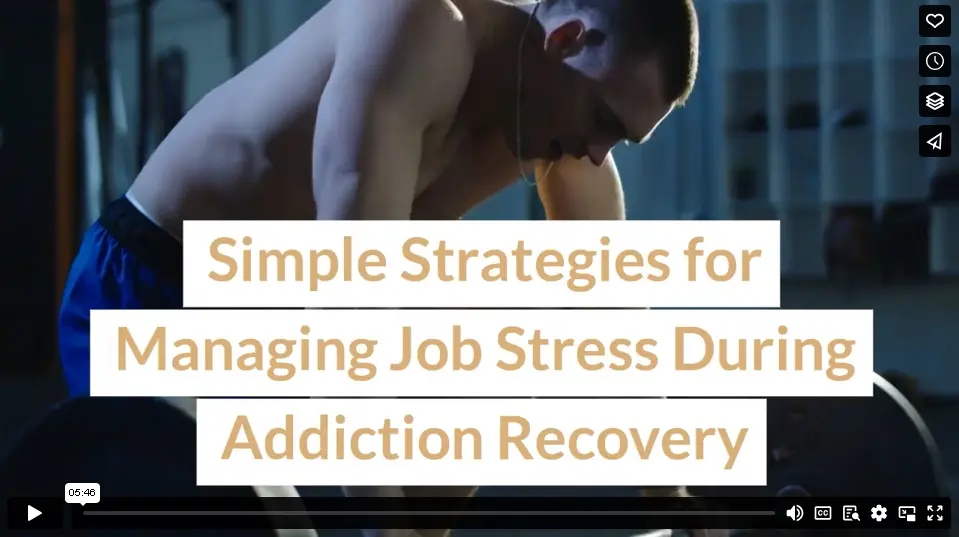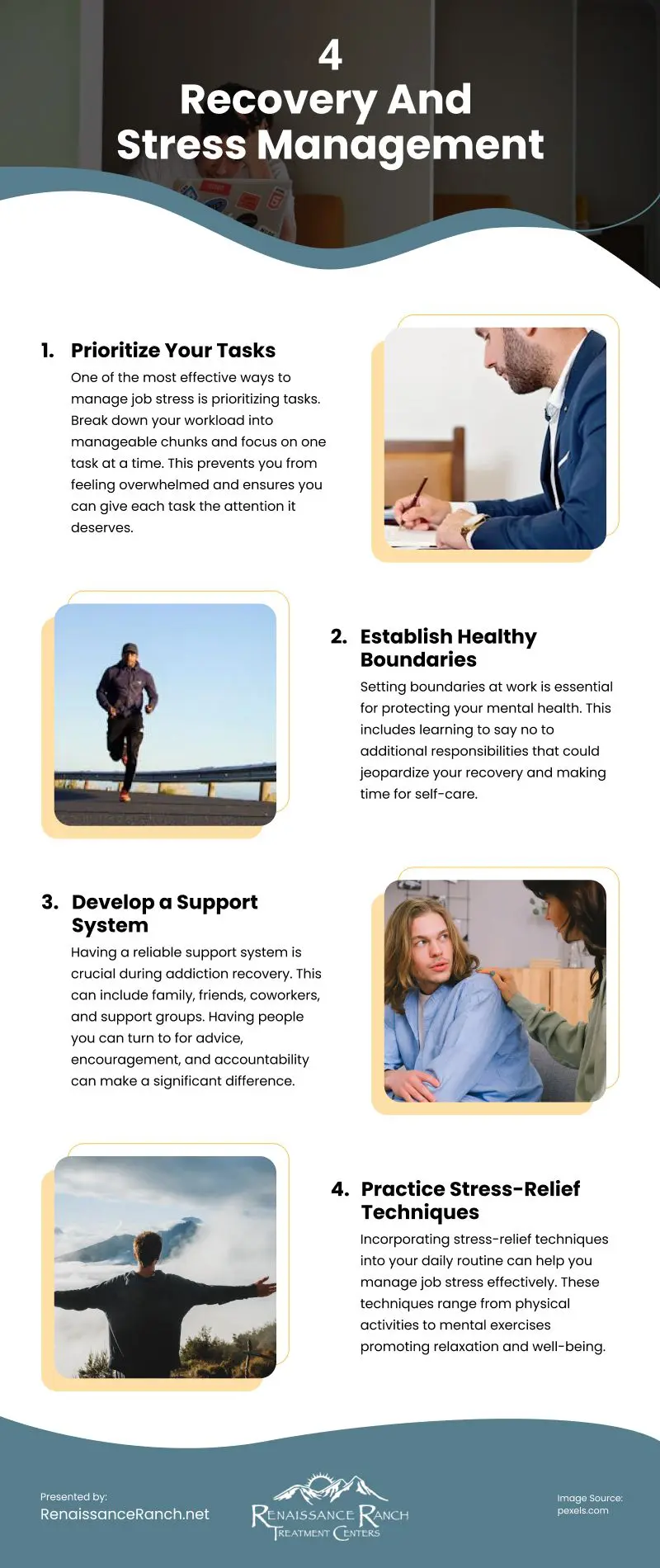Recovering from addiction is a challenging journey, especially when balancing it with the demands of a job. The workplace deadlines, performance pressures, and interpersonal dynamics can drive up stress levels, making the recovery process even more difficult.
However, with the right strategies, it is possible to manage job stress effectively while maintaining sobriety. Here are some simple yet powerful approaches to help you navigate this dual challenge, with a touch of spiritual guidance to provide additional support.

(cookie_studio/Freepik)
Understanding the Connection Between Job Stress and Addiction Recovery
Workplace stress is a significant factor that can trigger relapse in individuals recovering from addiction. The pressure to meet deadlines, the fear of failure, and the constant need to prove oneself can be overwhelming. In recovery, it’s crucial to recognize these stressors and address them proactively.
The Importance of Self-Awareness
Self-awareness is the first step in managing stress. By understanding your triggers and responses to stress, you can develop strategies to cope with them effectively. This involves regularly reflecting on your thoughts and emotions and recognizing when stress levels are rising.
Tips for Enhancing Self-Awareness:
- Journaling: Write down your thoughts and feelings daily to identify patterns and triggers.
- Mindfulness Meditation: Practice mindfulness to stay present and aware of your emotions.
- Prayer and Reflection: Engage in daily prayer or reflection to seek guidance and inner peace.
Practical Strategies for Managing Job Stress
1. Prioritize Your Tasks
One of the most effective ways to manage job stress is prioritizing tasks. Break down your workload into manageable chunks and focus on one task at a time. This prevents you from feeling overwhelmed and ensures you can give each task the attention it deserves.
Action Steps:
- Create a To-Do List: List your tasks in order of priority.
- Set Realistic Goals: Break large tasks into smaller, achievable steps.
- Use Time Management Tools: Utilize calendars and other planners to stay organized.
2. Establish Healthy Boundaries
Setting boundaries at work is essential for protecting your mental health. This includes learning to say no to additional responsibilities that could jeopardize your recovery and making time for self-care.
Action Steps:
- Communicate Your Limits: It’s good to be accommodating but not at the expense of your own well-being. Don’t be afraid to communicate your boundaries and stick to them.
- Schedule Breaks: Ensure you take regular breaks to recharge.
- Protect Personal Time: Keep work-related activities within work hours to maintain a healthy work-life balance.
3. Develop a Support System
Having a reliable support system is crucial during addiction recovery. This can include family, friends, coworkers, and support groups. Having people you can turn to for advice, encouragement, and accountability can make a significant difference.
Action Steps:
- Join a Support Group: Participate in addiction recovery groups where you can share experiences and gain support.
- Seek Professional Help: Enlist the help of a qualified addiction recovery center and engage with a therapist or counselor who can provide professional guidance.
- Lean on Faith Communities: If you’re part of a religious community, involve yourself in activities and seek support from fellow members.
4. Practice Stress-Relief Techniques
Incorporating stress-relief techniques into your daily routine can help you manage job stress effectively. These techniques range from physical activities to mental exercises promoting relaxation and well-being.
Action Steps:
- Exercise Regularly: Engage in physical activities such as walking, yoga, or swimming.
- Deep Breathing Exercises: Practice deep breathing techniques to calm your mind.
- Engage in Hobbies: Spend time on hobbies that bring you joy and relaxation.
The Role of Spirituality in Stress Management
For many, spirituality and faith play a crucial role in managing stress and maintaining sobriety. Drawing strength from a higher power and seeking spiritual guidance can provide comfort and resilience during challenging times. A faith-based recovery program can help you with this.
1. Embrace Faith-Based Practices
Incorporating faith-based practices into your daily routine can help you stay grounded and focused on your recovery journey. This can include prayer, meditation, and reading religious texts.
Action Steps:
- Daily Prayer: Set aside time each day for prayer and reflection.
- Meditative Practices: Engage in meditation to connect with your spiritual beliefs.
- Study Religious Texts: Read scriptures or religious books that inspire and guide you.
2. Find Strength in Community
Being part of a faith community can provide a sense of belonging and support. Engaging in community activities and building relationships with like-minded individuals can reinforce your recovery efforts.
Action Steps:
- Attend Services: Participate in religious services and community events.
- Volunteer: Offer your time and skills to support community initiatives.
- Build Relationships: Develop connections with fellow community members for mutual support.
Maintaining a Healthy Balance
Balancing work and recovery requires ongoing effort and commitment. It’s essential to regularly assess your stress levels and make necessary adjustments to your routine. Remember that recovery is a journey, and maintaining sobriety is your top priority.
Tips for Maintaining Balance:
- Regular Self-Check-Ins: Reflect on your stress levels and make adjustments as needed.
- Seek Feedback: Ask people you trust for feedback about your stress management strategies.
- Celebrate Milestones: Acknowledge and celebrate your progress in both work and recovery.
Managing job stress during addiction recovery is achievable with the right strategies and support systems in place. Prioritizing tasks, establishing boundaries, developing a support system, and practicing stress-relief techniques can significantly reduce workplace stress. Additionally, incorporating spiritual practices can provide comfort and strength, helping you stay focused on your recovery journey.
Video
Infographic
Recovering from addiction is tough, especially when juggling job responsibilities. High stress from deadlines and workplace dynamics can complicate recovery. However, effective strategies can help manage job stress while maintaining sobriety. Check out this infographic for practical tips.


